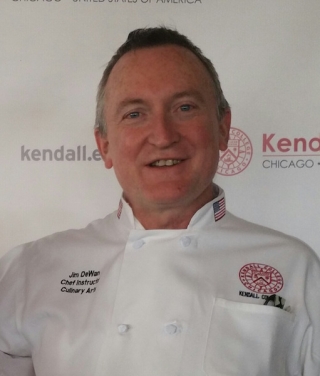
The American Cuisine Project
05 December 2015Kendall College is inserting classic American cuisine instruction throughout its culinary program and dining spaces. Tuna-noodle casserole, anyone?
By James P. DeWan, Kendall College School of Culinary Arts in Chicago chef instructor
Unless you’re a dedicated vegetarian, my bet is you’ve eaten more than your share of hamburgers. How else to explain the gazillion fast-food joints that bedeck our landscape from sea to shining sea?
And if you’re fortunate enough to be from someplace like Chicago or New York City, you’ve probably eaten a wagonload of hotdogs, too. In fact, when I host visitors to Chicago, I strongly suggest they try a Chicago-style dog, for no other reason than our local version of the venerable tube steak is such a major presence on our culinary scene. Fellow locals know the Chicago dog has mustard, relish, pickle, sport peppers, onions, tomato and celery salt. And NO KETCHUP (unless you’re under 12 years old).
Here’s the thing, though: Because I’m in the industry, that hotdog discussion is just part of a much larger discussion in which I champion all of our local foods. Sadly, for many people, that discussion stops at the dog. For too many of us, when we think about our local food, “American food,” we think about hamburgers and hotdogs and very little else.
“American cuisine is misunderstood,” says Kendall College chef instructor Elaine Sikorski, CEC, CCE, “because people think it’s just fast food, but it’s so much more than that.”
At Chicago’s Kendall College, where I serve on the culinary faculty, of course we know American cuisine is infinitely more complex. And, it’s because of that complexity we decided to broaden our curriculum and inserted teaching elements of regional American specialties into every class across our curriculum as well as Kendall’s three operating restaurants.
“We wanted total inclusion,” says chef Sikorski, who spearheaded the project, “because we felt it was so important that we wanted to give it a greater reach.”
Today, Kendall students receive instruction in American regional cuisine starting in their very first class with pancakes and Southern-style biscuits. Moving through the program, they make dishes such as: New England clam chowder, Yankee pot roast, Clams Casino, Oysters Rockefeller, homestyle meatloaf and barbecued baby-back ribs.
The real workhorses for delivering American regional cuisine are the College’s restaurants, particularly the cafeteria-style Café, where more than 3,000 meals are served weekly for breakfast, lunch and dinner.
“The cafeteria takes the lead because we can expose more people to these dishes,” says Thomas Meyer, lunch chef instructor in the Café. “They taste the dishes, and that sparks the conversation.”
Meyer encourages his students, who both make the food and serve it on the cafeteria line, to engage their customers in conversation about the food. “When we’re in our preproduction meeting, we’ll talk about menu and methodology and how it relates to that regionality, and the students pass that along to our customers.”
All too often, iconic American dishes are unknown not only to Kendall’s growing international population, but to American students as well. “Our American students don’t seem to know any more about American food than their international counterparts,” says Meyer.
No one at Kendall works harder to be that driver than Meyer. Up to 90% of items on his cafeteria menus can be made up of American regional dishes like Jambalaya, hush puppies, red beans and rice, and Salisbury steak. Other dishes commonly served are Boston baked beans, mac & cheese, Waldorf salad and tuna-noodle casserole. All these and more are simply part of the great tapestry that is American regional cuisine, the importance of which is driven home in every Kendall kitchen.
“When we’re having that conversation,” Meyer says, “we’re spreading the word and sparking a passion for American cuisine.”
For more information on Kendall College and its three F&B outlets on campus, which include the public, award-winning Dining Room, visit www.Kendall.edu.
James P. DeWan is a chef instructor in the Kendall College School of Culinary Arts in Chicago. Since 2005, he has been writing with wit and precision about cooking techniques and methods in “Prep School,” his monthly column for the Chicago Tribune. DeWan is an award-winning food writer co-author of The Zwilling J. A. Henckels Complete Book of Knife Skills: The Essential Guide to Use, Techniques and Care (Robert Rose, 2010) and Prep School: How to Improve Your Kitchen Skills and Cooking Techniques (Agate Surrey, 2013).
Photo of James P. DeWan courtesy of Kendall College.